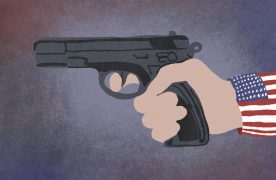In January 2002, the world still treated America as the victim of Osama bin Laden. Yet, as the memory of the Sept. 11 atrocities faded, anti-Americanism returned to its pre 9/11 levels. But as the year progressed, the United States re-examined its position in the world, and now holds the moral high ground.
The attacks in New York and Washington stimulated immediate sympathy for America. Soon, though, this compassion subsided and cynicism about United States foreign policy re-emerged. A series of policy decisions drained America’s diplomatic capital. First, the Bush Administration decided not to grant prisoner-of-war status to al Qaeda operatives. Second, President Bush agitated the world with his ‘Axis of Evil’ speech. Third, the United States sabotaged the International Criminal Court. Fourth, America downplayed the Johannesburg summit on Sustainable Development. Fifth, America missed an opportunity to foster nation-building in Afghanistan. A year after Sept. 11, the United States was the villain, not the victim.
Sept. 11 prompted Americans to ask why they had become the targets of terrorists. A year on, another question loomed: How is it possible that the world is not on our side after what happened to us? Two answers seemed likely. Either the world could not comprehend what America suffered on Sept. 11, or America made some policy errors that alienated the international community. The Bush Administration opted for the latter. And rightfully so.
This realization transformed American policy as the unilateralist sirens subsided and the multilateralists got their way. The United States resorted to the Security Council for disarming Saddam Hussein and opted for weapons inspectors before launching a military campaign in Iraq. The United States responded with restraint and explored diplomatic options when North Korea announced its weapons of mass destruction program.
This flexibility silenced critics who accused President Bush of oversimplifying the world and adopting a one-fits-all policy. NATO announced the accession of seven new members; the European Union the extension of its boundaries to Eastern Europe, Malta and Cyprus. The United States is pressuring the European Union to invite Turkey, whilst insisting that the government in Ankara endorse the United Nations’ plan for Cyprus. Finally, the United States is injecting life to the Doha Round of trade talks by announcing its vision of eliminating tariffs on manufactured goods by 2015. The villain is now the leader.
The puzzle looks promising, but there are a few pieces missing.
First, the United States needs to take environmentalism seriously. New York Times columnist Thomas Friedman wrote, ‘The most obvious bold national project that Mr. Bush could launch now … would be a program for energy independence … it [would be] Mr. Bush’s equivalent of Richard Nixon going to China the Texas oilman weaning America of its dependence on Middle East oil.’ Investing on cleaner and renewable energy will pay economic, security and diplomatic dividends.
Second, the United States should rethink its war on terrorism. On the one hand, terrorists have suffered major casualties. In July, the IRA admitted that, ‘it was not our intention to injure or kill non-combatants.’ The Greek police succeeded in dismantling one of Europe’s most successful terrorist organizations, ’17 November.’ In Spain, the courts banned Batasuna, a political party supporting Basque separatism, because of its linkages to ETA, a terrorist organization. And Yassir Arafat was pressured to rethink his modus operandi.
One the other hand, the war on terror created a bandwagon that allowed governments to crack down on dissidents. To win the war on terrorism, the Bush Administration has to realize that it is not fighting an anti-terrorism campaign but a campaign for freedom and democracy. Freedom suffers a vital blow not only when terrorists achieve their political agendas, but also when governments abridge their citizens’ political rights in their efforts to squash terrorists.
Third, President Bush should re-engage Israel and Palestine to foster a framework for the peaceful coexistence of the two peoples. As long as the Israelis and the Palestinians fight, the Arab world, and many others, will distrust America’s intentions and challenge American leadership.
Fourth, America has to accept that its dominance in the world is bound to nurture antipathy. The answer is to civilize anti-Americanism. ‘World peace,’ said John F. Kennedy, ‘like community peace does not require that each man love his neighbor it requires only that they live together in mutual tolerance, submitting their disputes to a just and peaceful settlement.’ Anti-Americanism should lead to protest and intellectual discourse, not mass murder.
Finally, free trade in manufacturing and services has to be complemented with free trade in agriculture and compensation for those dislocated or harmed by trade. The world also needs a bailout for Argentina to restore confidence in emerging markets and reinvigorate international trade.
America has matured in 2002. Let us hope that 2003 will be even better.
This is an account occasionally used by the Daily Free Press editors to post archived posts from previous iterations of the site or otherwise for special circumstance publications. See authorship info on the byline at the top of the page.












